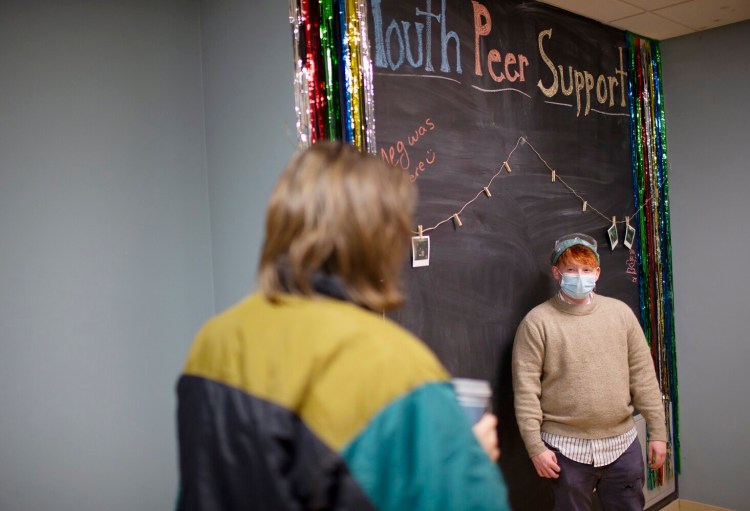For 17-year-old Lucy Watson, it’s often been hard to know where to turn to talk about mental health.
“When you have mental health struggles, it’s really hard to find friends,” said Watson, a senior at Windham High School. “It’s like you’ll be fine and then once you’re struggling, they’re like, ‘Why are you struggling?’ I’ve had people tell me, ‘You have nothing wrong in your life.’ I guess they don’t get that depression doesn’t always have to be when something’s wrong.”
Watson found it helpful working with a peer support program and attending a weekly activity group. Now she’s hoping to build on what she’s gotten out of that at a new space called the Portland Peer Support Center, where young people can seek support for mental health or substance abuse challenges from others their age who have gone through similar struggles.
On a recent afternoon, Watson was one of more than a dozen teens and people in their early 20s who came to mark the opening of the center, located inside Maine Behavioral Healthcare at 165 Lancaster Street.
The center will be used for a variety of programs at Maine Behavioral Healthcare, including the Youth Peer Support Statewide Network, which serves young people from 14 to 26 around Maine. No payment or advanced registration is required for the network’s drop-in hours or activities and staff are trained in intentional peer support, a framework for building relationships around shared experiences.
“The goal is really that the relationships are mutual (between youth and staff),” said Ariel Linet, the network’s manager. “The youth get involved and get to make choices on how they want to show up and be perceived. They get to choose whether they want to participate, how long to participate and what they want to do with us.”

Lucy Watson, 17, of Windham at Maine Behavioral Healthcare peer support center open house. Derek Davis/Staff Photographer
The center, which is the first physical space the network will occupy, comes at an important time since the COVID-19 pandemic has contributed to a surge in mental health needs for young people. From 2019 to 2020, the number of mental health-related emergency room visits for 12 to 17-year-olds increased 31 percent, according to the U.S. Centers for Disease Control and Prevention.
Linet said the model that staff at the center will use is to approach mental health with a sense of curiosity rather than fear.
“A lot of times the response you get is, ‘Let’s restrict you, let’s put you in a hospital or let’s take away various freedoms,'” Linet said. “I think a lot of young people have felt disempowered or like they can’t be trusted to make good decisions for themselves – and if you talk about the things you’re feeling, that’s just more evidence of how unstable you are. We try to be present and listen and ask questions.”
The center will hold drop-in hours from 3:30 to 5:30 p.m. on Tuesdays starting in January and may adjust times depending on the feedback it gets. There will also be peer support groups, art groups, movie nights and other activities.
Watson said it can be hard to talk about mental health at school. As a young person, sometimes it can feel like mental health services are something you’re being forced into. “Once you realize there are other people it’s worked for and they have made progress, it puts hope in you that you might be able to recover,” she said.

Yacob Olins, 22, of Freeport at Maine Behavioral Healthcare peer support center open house. Derek Davis/Staff Photographer
She said she’s hoping to have more in-person time with others her age since the peer support she’s done in the past has been largely online. She sees the center as a place she might go just to hang out or spend time reading. “I really like the idea of it,” Watson said. “It’s a safe place is what I see it as.”
Yacob Olins, 22, of Freeport, has been involved in peer support online for about a year and said he’s also looking for a way to get that opportunity in person. Olins said during the open house at the center last week that he could see coming to social events like movie nights.
“Getting to get out and be involved in a typical, healthy way and combining that with a lot of the benefits of peer support where we’re meeting with people who have similar lived experiences, it’s reaffirming that what we have gone through and what others will inevitably go through is OK and survivable,” Olins said.
Send questions/comments to the editors.




Success. Please wait for the page to reload. If the page does not reload within 5 seconds, please refresh the page.
Enter your email and password to access comments.
Hi, to comment on stories you must . This profile is in addition to your subscription and website login.
Already have a commenting profile? .
Invalid username/password.
Please check your email to confirm and complete your registration.
Only subscribers are eligible to post comments. Please subscribe or login first for digital access. Here’s why.
Use the form below to reset your password. When you've submitted your account email, we will send an email with a reset code.